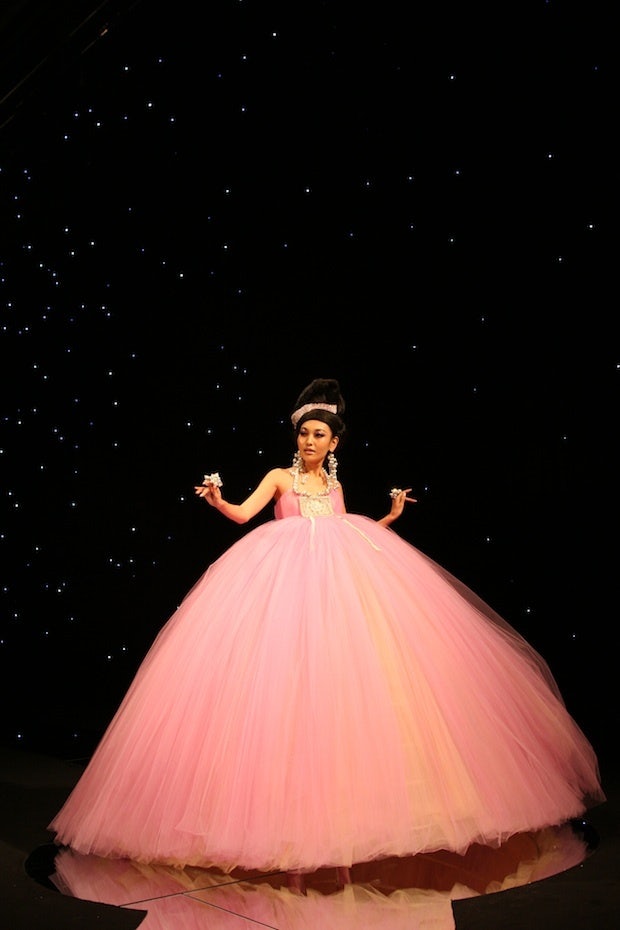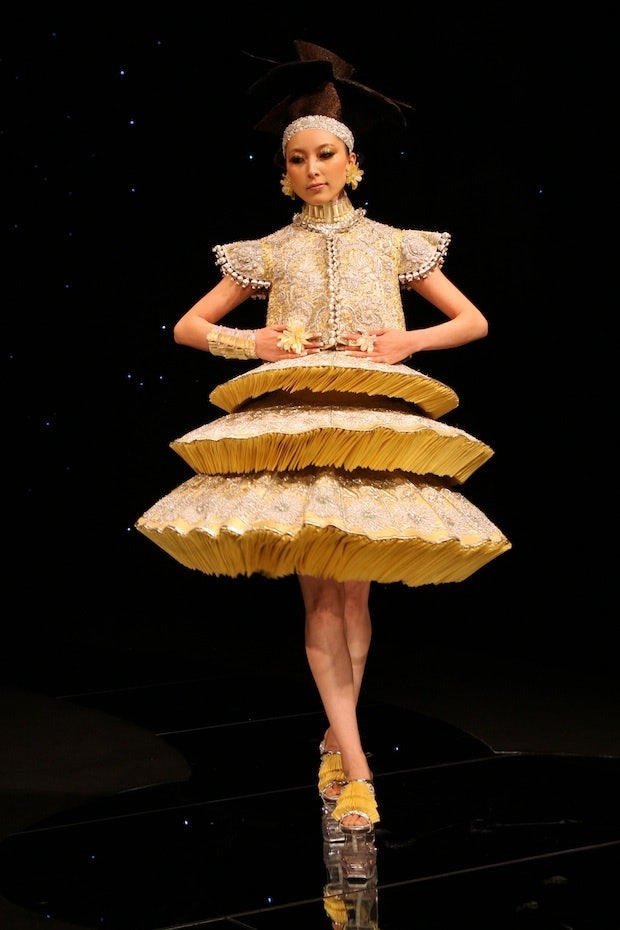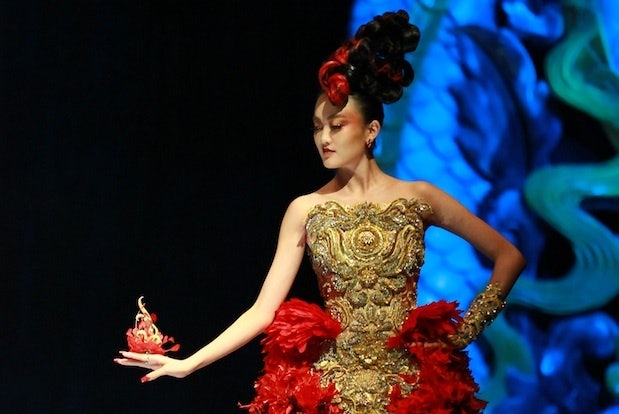"I'm Not Part Of Pop Culture, Although What I Do May Coincide With Pop Culture"#
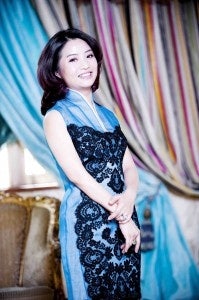
Following her recent Chinese Brides exhibition in Beijing and a relaxing vacation in Morocco, Beijing-based fashion designer
Guo Pei#
(郭培) is radiant, sporting a thick mane of glossy wine-red hair and looking right at home in a stunning Issey Miyake one-piece dress. Warm and humble, but with a firm tone of voice, Guo is now enjoying the fruits of her labor, with the success and international exposure of her
Rose Studio#
label growing and her pieces finding fans in celebrities like Lady Gaga and Zhang Ziyi. With an innate passion for fashion, Guo has blazed her own path in the Chinese fashion world, developing a one-of-a-kind style that is often emulated but never truly replicated. As Hong Huang wrote this spring in her ChinaFile column for WWD, "If there is Haute Couture in China, it would have to be in the Rose Studio by Guo Pei. But it is nothing like any atelier you have seen in the West."
Last month, Guo Pei's two-day "Chinese Brides" (中国新娘) exhibition, three years in the making, was shown in Beijing, featuring more than 50 highly-detailed custom garments created by Guo and her team over the past 30 months. Guo's bridal designs were widely applauded for seamlessly infusing distinctly Chinese elements, combining cutting-edge and classic, and putting a cultural spin on the concept of avant-garde fashion. In the designer's own view, her recent exhibition was a milestone in her 30-year career.
Recently, Jing Daily sat down with Guo Pei in Beijing to discuss her "Chinese Brides" series, her thoughts on pop culture and fashion, the state of couture in China, and how she balances the demands of career and family. (Interview translated from the original Chinese.)
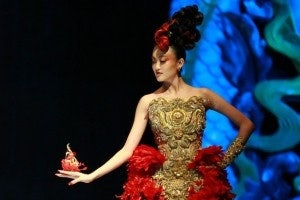
Jing Daily (JD): First off, congratulations on the success of your Chinese Brides exhibition. What can you tell us about what went into that project?#
Guo Pei (GP)#
: "Chinese Brides" was a two-part exhibition. The first half was called "Story of the Dragon," and the other "Wedding Dresses." "Story of the Dragon" was mostly high fashion, showing off my more avant-garde pieces, while "Wedding Dresses" was an attempt to, through my design and the detail and beauty of traditional Chinese wedding dresses, have an emotional effect on Chinese people and Chinese women. To get married is to start a new family, and it also has an element of national stability to it, and I mean that in a cultural rather than a political way. It's also not just a high-end thing for a minority of people, it's for everybody.
It's been 30 years since I first started off as a fashion student. I've experienced the evolution of Chinese fashion every step of the way. So "Chinese Brides" was a way to show that in a deeper way, in the hopes that it can be seen as a landmark of what I've seen and experienced over the years. I feel like that's my responsibility.
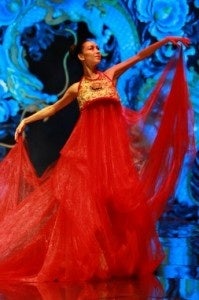
JD: You mentioned that couture has to have its own style. How do you blend elements of Chinese and international trends in your work?#
GP#
: This is from my understanding of what's popular and fashionable. What's popular is man-made, intentional, designed to achieve business goals. It's a sort of summary of society. It needs a certain response from potential buyers, and eventually you start to see one response in the form of shanzhai (copycatting). If designers can be more original and individualistic, nothing will be "popular" or trendy.
But what is fashion? Fashion reflects the tastes of this day and age. It's a reflection of what people are feeling. Now Chinese people's tastes show a kind of national spirit, so through my designs I try to reflect the current place in which Chinese people find themselves. I try to interpret national feelings. So I feel my designs are fashion. But I don't rely only on Chinese elements. I do believe, though, that classic elements need to work their way in organically, slowly infusing themselves into pieces. I'm not part of pop culture, although what I do may coincide with pop culture.
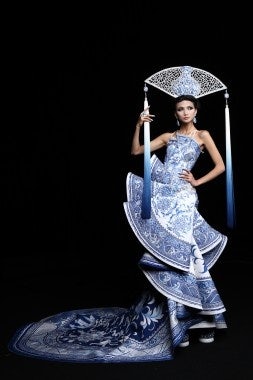
JD: During China Fashion Week, we saw a lot of recent works by Chinese designers. Are you optimistic about young Chinese designers? How do you feel about the status of Chinese designers in the international fashion world?#
GP#
: From a designer's point of view, I tend to focus mostly on my own work, not looking around at what others are up to, and I've paid less and less attention to the scene as a whole. I'm not familiar with many young designers.
It's like being a painter. If you work in different styles, it's hard to say if another artist is good or bad. Everybody is doing something different. If I give an example of someone I kind of like, I could say a designer from my own generation, Ma Ke (马可). Her work is really deep, and I'd say more expressive than mine. We both have a strong disposition, and basically are unshakeable.
But in general, it used to be that people would just say "China has no high-end couture." Now their attitudes have changed and they're more accepting. I don't have the experience of studying abroad, which is something I used to regret. But now I'm really proud of the work that home-grown designers are doing here.
JD: Do you have any intention of breaking into overseas markets?#
GP#
: I don't plan to deliberately expand overseas. I think it'll happen naturally. If the hopes of other people exceed your ability to fill them, the pressure really builds. The way I feel is that if you go out into the world, it's best to be invited. Recently I was invited by the Red Cross to go to Switzerland to join their board, and brought with me eight special outfits to show there. On July 1, I'll go to Japan on invitation of the government there to do shows on July 2-3.
Many people feel I have a lot of support behind me, but actually I'm doing my own thing quietly. I don't do public relations, I focus on maintaining human relations. My dream is to make beautiful clothes. Business isn't my driving force.
JD: Your designs are often seen at big national events, and became a hot topic this Chinese New Year on Weibo. Have you followed this? There was a bit of controversy on Weibo this year when one journalist said "Guo Pei's designs mimic Alexander McQueen's."#
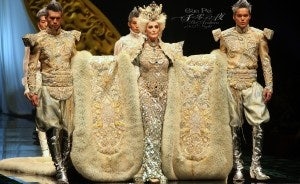
GP#
: I do lots of designs for the CCTV Spring Festival program (chunwan), but a lot of the designs had input from their producers, so I'd sort of describe what I do for them as a service. I've collaborated on chunwan for several years now, and some people were struck by the designs. They thought they were beautiful and did some research, then found out I'd done them. Actually, I didn't really want to be so obviously linked to the program. Because what I do with that program is business. I'm not trying to raise my profile.
After that journalist made his comment, I phoned him. I asked him why he didn't just ask me if it was my own original designs rather than just blithely saying I was imitating another designer?
JD: Who's your favorite designer?#
GP#
: There aren't any designers I don't like, actually. Every designer has a different way of expressing beauty, so you can see how I interpret beauty by looking at my work. Coco Chanel expressed herself in her own way, and many people like Chanel because they like the type of woman Chanel represents. Dior depicted his own idea of femininity, and the lines are, I'd say, more feminine in general. I prefer Dior. Chanel's little jackets don't really suit me.
JD: You've achieved a great deal of success in your career, but are also a wife and mother. How do you balance work and family?#
GP#
: I work from Monday to Saturday and take care of domestic stuff on Sunday. I've got two daughters and I'm happy in my family life. I get to spend a lot of time with them.
